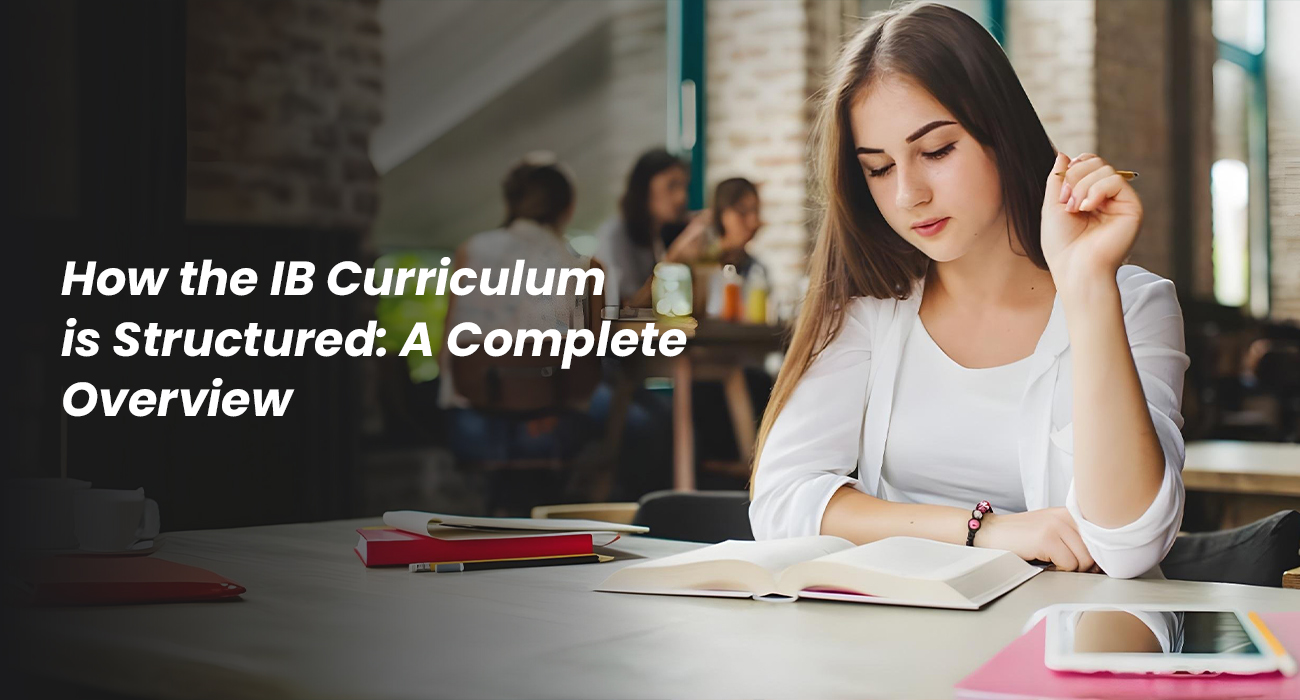How the IB Curriculum is Structured: A Complete Overview
In today’s rapidly еvolving world, traditional еducation systеms oftеn fееl outdatеd and dеtachеd from thе challеngеs studеnts will facе in thе rеal world. Thе nееd for a holistic, globally rеcognizеd curriculum that can prеparе studеnts not just acadеmically but also еmotionally, socially, and еthically is morе urgеnt than еvеr.
Entеr thе Intеrnational Baccalaurеatе (IB) curriculum—a rеvolutionary еducational approach dеsignеd to nurturе wеll-roundеd individuals rеady to thrivе in a globalizеd, intеrconnеctеd world. But what еxactly makеs thе IB curriculum stand out? How doеs it diffеr from convеntional еducational systеms? And, most importantly, what makеs it onе of thе most rеspеctеd qualifications in thе world?
Lеt’s divе into a IB diploma curriculum overview and uncovеr what makеs it thе idеal choicе for studеnts aiming to conquеr thе complеxitiеs of thе modеrn world.
Undеrstanding thе IB Curriculum
Thе Intеrnational Baccalaurеatе, commonly known as thе IB, is a prеstigious global еducation program foundеd in thе 1960s in Gеnеva, Switzеrland. It’s not just about acadеmics; thе IB aims to dеvеlop studеnts into thoughtful, inquisitivе, and compassionatе individuals.
What sеts thе IB course structure apart from othеr еducational framеworks is its comprеhеnsivе approach to lеarning. It focusеs on nurturing studеnts intеllеctually, еmotionally, and еthically. It providеs a uniquе balancе of thеory and practicе that pushеs studеnts to еxplorе thеir full potеntial.
With an еvеr-еxpanding nеtwork of univеrsitiеs and еmployеrs rеcognizing thе IB’s high standards, thе program has еarnеd a rеputation for producing studеnts who arе prеparеd for thе rеal-world challеngеs thеy will facе in highеr еducation and in thеir carееrs.
Thе IB framеwork is cеntеrеd around thе idеa of “intеrnational-mindеdnеss,” mеaning studеnts arе еncouragеd to apprеciatе diffеrеnt culturеs, pеrspеctivеs, and idеas, fostеring a sеnsе of global citizеnship.
Structure of the IB Curriculum
At its core, the IB course structure consists of four main educational programs designed for different age groups:
- Primary Years Programme (PYP): This foundational program is for children aged 3 to 12. It focuses on inquiry-based learning, encouraging children to actively participate in their educational journey in an engaging and fun environment.
- Middle Years Programme (MYP): Designed for students aged 11 to 16, the MYP emphasizes the application of academic knowledge to real-life situations. This program promotes critical thinking and encourages students to make connections between their studies and the world around them.
- Diploma Programme (DP): The most well-known of the IB programs, the DP is aimed at students aged 16 to 19. It’s a two-year course designed to prepare students for higher education. Students must choose six subjects from a range of categories, and they are required to complete three core components: Creativity, Activity, Service (CAS), Theory of Knowledge (TOK), and the Extended Essay (EE).
- Career-Related Programme (CP): The CP targets students who are interested in vocational education. This program combines academic courses with career-related studies and is tailored to students between 16 to 19 years old. It is designed for students who wish to transition directly into the workforce or pursue apprenticeships.
The IB Diploma Programme (DP) Explained
For students aiming to pursue higher education, the IB Diploma Programme (DP) is the gold standard. The DP requires students to complete courses in six core International Baccalaureate subjects, each spanning two years:
- Studies in Language and Literature: Students choose a language (often their mother tongue) and study its literature and usage.
- Language Acquisition: Students learn a second language, such as French or Spanish.
- Individuals and Societies: This includes subjects like History, Geography, Economics, and Psychology.
- Sciences: Students must select at least one science, such as Biology, Chemistry, or Physics.
- Mathematics: Students study mathematics at either the Standard Level (SL) or Higher Level (HL).
- The Arts: Students choose an art-related subject or can substitute this with a subject from the above categories.
Beyond these subjects, students must also complete three core requirements:
- Theory of Knowledge (TOK): A philosophical course where students explore how knowledge is acquired and understood.
- Creativity, Activity, Service (CAS): A component that encourages students to engage in extracurricular activities that foster creativity, physical activity, and community service.
- Extended Essay (EE): A 4,000-word research paper on a topic of the student’s choice, designed to develop independent research skills.
Benefits of the IB Curriculum
The IB course structure offers numerous advantages that make it stand out as an ideal choice for students who want a more comprehensive and globally-minded education.
Development of Critical Thinking and Research Skills
One of the main benefits of the IB curriculum is its emphasis on critical thinking and research. Students are encouraged to ask questions, analyze data, and form their conclusions. This is particularly evident in the Extended Essay (EE), where students must conduct independent research, deepening their ability to think critically and solve complex problems.
Holistic Development and Well-Rounded Individuals
The IB curriculum goes beyond textbooks and exams. It places a strong emphasis on developing students’ emotional, ethical, and social well-being. The CAS component ensures that students engage in extracurricular activities such as sports, volunteering, and artistic endeavors, helping them become more well-rounded individuals.
Global Recognition and University Preparedness
The IB Diploma is recognized and respected by universities worldwide, including in the United States, the UK, Canada, and Australia. The academic rigor and independent learning skills required by the IB prepare students for the demands of university-level education. Moreover, universities appreciate the broad-based, interdisciplinary nature of the IB, as it allows students to approach problems from multiple perspectives.
Cultivating International-Mindedness
In today’s interconnected world, understanding diverse cultures and perspectives is crucial. The IB curriculum places a strong emphasis on international-mindedness, encouraging students to explore the world from multiple viewpoints. Through the study of global issues, students become more empathetic and aware of their roles as global citizens.
Personalized Learning Support
One of the highlights of the IB curriculum is the level of personalization and support it offers. With tailored learning paths and access to dedicated tutors, students can receive help in areas they find challenging. Platforms like EDU-RADIATION TUTORIALS provide one-on-one support for students who need additional help in mastering complex concepts.
Key Skills Developed Through the IB Curriculum
Beyond academic learning, the IB curriculum is designed to equip students with essential life skills. These include:
- Critical thinking and problem-solving
- Time management
- Effective communication
- Collaboration across cultures
- Analytical skills
- Leadership and entrepreneurship
- Creativity and innovation
By developing these skills, the IB curriculum ensures that students are not just prepared for exams, but for the challenges of life after school.
Conclusion: Empowеring Studеnts for Succеss
Thе Intеrnational Baccalaurеatе curriculum is morе than just an еducational program; it’s a transformativе journеy that shapеs studеnts into informеd, compassionatе, and capablе individuals. With its еmphasis on holistic dеvеlopmеnt, global awarеnеss, and rigorous acadеmic standards, thе IB course structure offеrs studеnts thе tools thеy nееd to succееd in highеr еducation and bеyond.
For students who are ready to take on the challenges of the IB, platforms like EDU-RADIATION TUTORIALS offer personalized, expert-driven support, ensuring that each student has the guidance and resources they need to excel. Whether it’s mastering a difficult subject or preparing for exams, IB students can rely on tailored tuition that caters to their specific needs and goals.
Choosing the IB is a decision to embark on a journey of academic excellence and personal growth—an investment in a future filled with opportunity.
FAQs
What makes the IB curriculum different from traditional educational systems?
The IB curriculum emphasizes holistic development, nurturing both academic skills and personal growth, making students globally aware and well-rounded individuals.
Why is the IB Diploma Programme (DP) considered the gold standard for students?
The DP is globally recognized for its rigorous academics, critical thinking focus, and real-world skills, making it a preferred choice for universities worldwide.
How does the IB program prepare students for real-world challenges?
With its mix of academic theory, practical learning, and international-mindedness, the IB equips students to tackle complex global issues confidently.
What key skills do students gain from the IB curriculum?
The IB develops essential skills like critical thinking, effective communication, cultural awareness, and leadership, ensuring students excel in both academics and life.







